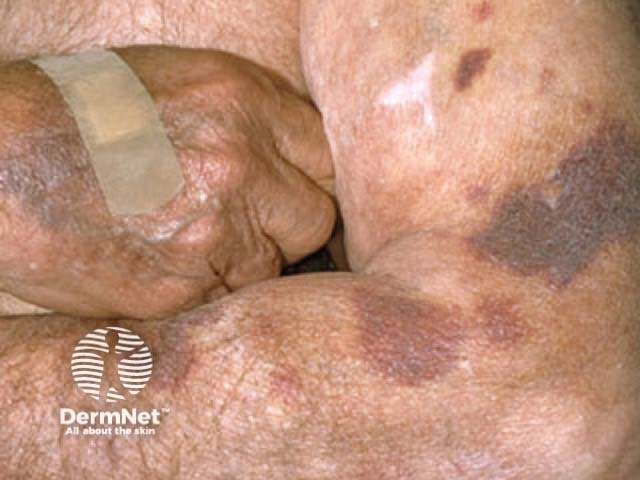Main menu
Common skin conditions

NEWS
Join DermNet PRO
Read more
Quick links
Treatments Blood vessel problems
Author: Vanessa Ngan, Staff Writer, 2005. Updated by Hon A/Prof Amanda Oakley, November 2015.
" data-index="1" alt="Go to Introduction
" onclick="event.preventDefault();document.getElementsByTagName('h2')[(1 - 1)].scrollIntoView({behavior: 'smooth',block: 'start'});">Introduction
" data-index="2" alt="Go to Classification
" onclick="event.preventDefault();document.getElementsByTagName('h2')[(2 - 1)].scrollIntoView({behavior: 'smooth',block: 'start'});">Classification
" data-index="3" alt="Go to Signs and symptoms
" onclick="event.preventDefault();document.getElementsByTagName('h2')[(3 - 1)].scrollIntoView({behavior: 'smooth',block: 'start'});">Signs and symptoms
Treatment
Purpura is the name given to the discolouration of the skin or mucous membranes due to haemorrhage from small blood vessels.
Extravasated blood usually breaks down and changes colour over a few weeks from purple, orange, brown and even blue and green.
There are many different types of purpura. Their classification depends on the appearance or cause of the condition.
Platelet disorders |
Thrombocytopaenic purpura—due to destruction of platelets
|
|
Other coagulation disorders |
|
|
Vascular disorders |
Non-thrombocytopaenic purpura—leakage of blood through the vessel wall
|
|
The signs and symptoms of purpura vary according to the type of purpura. The following broad generalisations may be made.

Suction bruise

Injury

Venous stasis

Vasculitis

Steroid purpura

Disseminated intravascular coagulation
The underlying cause of purpura should be identified and treated accordingly.